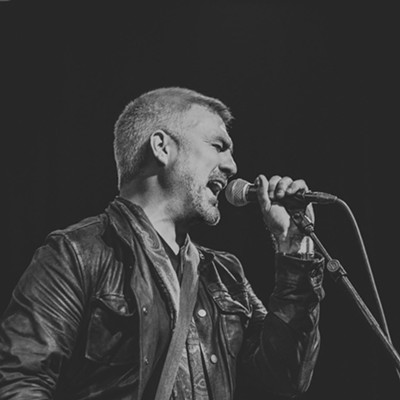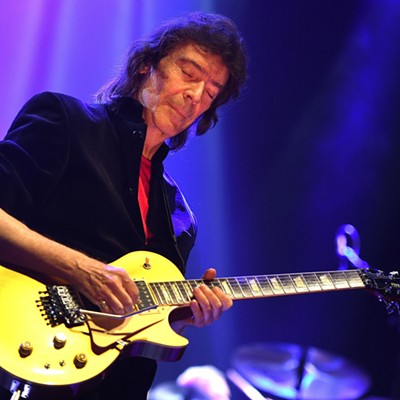Over the course of his 25 album career, which includes three platinum and 13 gold recordings, Cockburn has worn many hats simultaneously: folk singer/songwriter; world traveler; political activist; Christian and more. His songs chronicle a life of conscience and passion with a richness and consistency to which most artists can only aspire.
However, "there have been many bumps," he admits. "Sometimes there are chasms that have to be crossed. And sometimes you're crossing them on a thread. I think everybody's life must have those things. That's how you grow."
Cockburn's songs, like "Wondering Where The Lions Are," "If I Had A Rocket Launcher," "Lovers In A Dangerous Time" and "If A Tree Falls," are informed by both an intelligent lyrical sensibility and a mature sense of ethics. Already engaging with well-turned phrases and organic constructions, his songs become even more interesting once you realize they're non-fiction. Cockburn lives the events and describes what he sees, whether visiting "The Mines of Mozambique" or "The Tibetan Side of Town." Cockburn's political travelogues are not imaginary abstractions but the correspondence of a global life.
"All those songs sprang from direct experiences and they wouldn't have sprung from any other thing," he explains. "It's part and parcel to the way I write, to how I approach songwriting as a whole. The songs are attempts to do something with an emotional response I'm confronted with. Without that confrontation, that emotional response, there would be no songs. For me, what is essential is to write about as much of the human experience as I can. That includes political songs, but it doesn't preclude love songs, and songs about sex and whatever else might come up."
As a testament to his journalistic writing style, Cockburn generally chronicles a song's birth with its date and location of inception, although such information is absent on his current album, Breakfast in New Orleans, Dinner in Timbuktu.
"On this album, they were left off in an unfortunate oversight," he says. "People were wondering if I had some new agenda, but I don't. It was just an oversight.
"In theory, the songs are supposed to be comprehensible in some way without that information. In some cases, I think it helps give a sense of where the song is coming from. It's helpful to know that a song that's related to a particular place and time was actually inspired in that place and time.
"In other cases," he concedes, "it's not so critical to anybody's understanding of the song. A song like 'Mango,' it makes no difference where the song was written. Some of the other ones, it does, and it would have been helpful for people to know that the imagery of 'Use Me While You Can,' for example, all comes from Mali, West Africa, where Timbuktu is. It might have been helpful to know the lyrical content of 'When You Give It Away' came from New Orleans, which makes sense in terms of the title of the album."
Part of the enduring nature of Cockburn's music is in its textures and chordal complexity. His songs blend folk, jazz, pop and world sensibilities with his incendiary guitar skills.
"Originally, I thought I wanted to be a jazz guitar player," he confesses. "Then I got into attempting to learn composition for big bands and jazz groups of various sizes. That's what I went to Berklee to study. But after being there about a year and a half, I realized that that wasn't my road. So I dropped out and joined a rock and roll band. It was in the context of that band that I first saw myself as somebody who wrote songs. But I had already been playing ragtime and country blues. I was in a jug band in Boston the same time I was going to Berklee."
In 1997, Berklee College of Music awarded Cockburn an honorary doctorate of music degree in recognition of his lifelong achievements.
Asked how his style has changed, he says, "Musically, I feel like I've got a better...well, hell, no, I shouldn't say better. I'm a lot fussier than I used to be," he laughs. "That's the thing I notice most about my evolution as a writer. I settle much less easily for things than I did. I feel I have a better grasp of how to distill events and images into words than I did when I started. I think the songs generally tend to be more subtle and multi-layered lyrically."
Now on the road with a drummer and bass player, Cockburn is touring in support of Breakfast In New Orleans, as well as offering a retrospective of his career. Continuing to enthusiastically endorse political stances about the environment and the poor, he has most recently joined the movement to eliminate the use of land mines as a weapon of war.
"For me, it's all one big issue," he says. "All of these things are aspects of how we treat each other and how we relate to the nature of which we are part. Anytime I can address any of those aspects, I'm happy to do it. It's all really about human dignity and human survival."
Bruce Cockburn takes the stage at 7 p.m. Wednesday, February 23, at the Rialto Theatre, 318 W. Congress St. Tickets are $24, available in advance from all Dillard's outlets and by phone at 1-800-638-4253.







